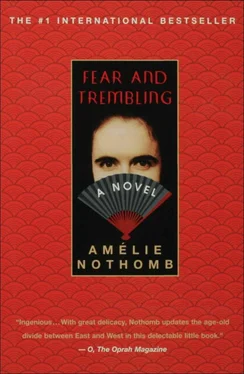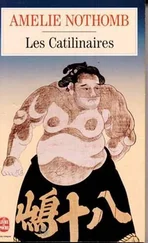“It is your duty to be beautiful, though your beauty will afford you no joy. The only compliments you receive will be from Westerners, and we know how short they are on good taste. If you admire yourself in the mirror, let it be in fear and not delight, because the only thing that beauty will bring to you is terror of losing it. If you are pretty, you won’t amount to much; if you are not, you will amount to nothing.
“It is your duty to marry, preferably before your twenty-fifth birthday, which is your date of expiration. Your husband will not love you, unless he’s a half-wit, and there is no joy in being loved by a half-wit. You will never see him anyway. At two in the morning an exhausted—and often drunk—man will collapse in a heap onto the conjugal bed, which he will leave at six o’clock without a word.
“It is your duty to bear children, whom you will treat like gods until they turn three, when, with one clean blow, you will expel them from paradise and enlist them for military service, which lasts until they are eighteen, and then from twenty-five until death. You will bring into the world creatures that will be all the more miserable because during the first three years of their lives you imbued them with a notion of happiness.
“You think that’s horrible? You are not the first to think that. People like you have been thinking that since 1960. And yet it has done little good. Some have rebelled, and you too may well rebel during the only free period of your life, between the ages of eighteen and twenty-five. The instant you turn twenty-five, you will realize that you are not married, and you will be ashamed. You will exchange your eccentric clothes for a tidy little blazer, white tights, and grotesque pumps. You will subject your magnificent glossy hair to excessive blow-drying, and you will feel relief when someone—a husband or an employer—wants anything whatever to do with you.
“In the unlikely event of your marrying for love, you will be even more miserable, because you will see your husband suffer. It is better not to love him. This will allow you to be indifferent to the collapse of his ideals (your husband may still have some even if you don’t). For example, he has been permitted the illusion that he will be loved by a woman. He will quickly realize that you don’t love him. How can you love someone when your heart is set in a plaster cast? You’ve been too weighed down by duties, too bound by limits, to be capable of love. If you love someone, you must have been badly brought up. For the first few days of your marriage, you will fake all sorts of things. It has to be said that no other woman in the world can fake quite the way you do.
“Your duty is to make sacrifices for others. But do not let yourself think that your sacrifices will make those for whom you make them happy. Those sacrifices will only allow them not to be ashamed of you. You have no hope of either being happy or of making others happy.
“And if by some extraordinary chance you manage to escape one of these prescriptions, do not take this to mean you have triumphed. Take it to mean that you must have gone wrong somewhere. Actually, you will very soon come to realize any illusion of victory can only ever be fleeting. Do not attempt to enjoy the moment. Leave that sort of error in judgment to Westerners. The moment means nothing, your life means nothing. No period of time less than ten thousand years counts for anything.
“If it is any consolation, no one considers you less intelligent than a man. If you are brilliant, everyone will know, even those who treat you like dirt. And yet, if you think about it, is that really so comforting? If they thought of you as inferior at least that would provide some explanation for the private hell in which you live, and offer you hope of escape—by demonstrating how wonderful your mind truly is. If you are seen as an equal, or even superior, your Gehenna, your living hell, is absurd. That means there is no way out.
“Ah, but there is one! Just one. One to which you have every right to avail yourself—unless you have been stupid enough to convert to Christianity. You have the right to commit suicide. Suicide is a very honorable act. Do not deceive yourself into believing that the hereafter will be anything like the jovial paradise Westerners describe. There’s nothing like that on the other side. What makes suicide worthwhile is its effect on your posthumous reputation, which will be dazzling, a source of family pride. You will hold a cherished place in the family vault. And that is the highest honor any human being can hope to attain.
“Granted, you can choose not to commit suicide. But then, sooner or later, you will find you can no longer cope, and slip into some form or other of dishonor: take a lover, indulge gluttony, grow lazy. It has been observed that humans in general, and women in particular, find it hard to exist for any length of time without succumbing to one of these carnal pleasures. If we are wary, it will not be out of Puritanism. That is an American obsession.
“It is best to avoid any kind of physical pleasure, because it is apt to make you sweat. There is nothing more shameful than sweat. If you gobble up a steaming bowl of noodles, if you give in to sexual craving, if you spend the winter dozing in front of the fire, you will sweat. And no one will be in any doubt that you are coarse.
“The choice between sweat and suicide isn’t a choice. Spilling one’s blood is as admirable as spilling sweat is unspeakable. Take your life, and you will never sweat again. Your anxiety will be over for all eternity.”
THE EATE OF the Japanese man isn’t that much more enviable. Japanese women at least have the chance to leave the hell that is their work by getting married. Not working for a Japanese company, I began to see, might be an end in and of itself.
But the Japanese man has not been asphyxiated. He has not had all traces of his ideals destroyed from earliest childhood. He has been allowed to retain one of the most fundamental of human rights: that of dreaming and hoping. He has been allowed to conjure an imaginary world over which he is the master.
A Japanese woman does not have recourse to this if she is well brought up—as is the case with the majority. Her imagination has been amputated. That is why I proclaim my profound admiration for any Japanese woman who has not committed suicide. Staying alive is an act of resistance and courage both selfless and sublime.
ALL THIS IS what I thought of when I contemplated Fubuki.
“What you are doing?” she asked me in an acerbic voice.
“I’m dreaming. Don’t you ever do that?”
“Never.”
I smiled. Mister Saito had just become the father of a second child, a son. One of the wonders of the Japanese language is that you can create an infinite number of names, drawn from all the parts of speech. By one of those bizarre quirks of which Japanese culture offers abundant examples, those who have no right to dream bear names that solicit dreaming, such as “Fubuki.” Parents indulge in the most delicate lyricism when it comes to naming a girl. When it comes to naming a boy, on the other hand, the results are often hilariously mundane.
Thus, as it was perfectly acceptable to select a verb in the infinitive as a name, Mister Saito had named his son Tsutomeru, which means “to work.” The thought of a child burdened with an agenda disguised as a name was sadly funny.
I imagined the poor kid coming home from school in a few years, his mother waiting by the door. “So you’re home, Work. Do your homework!” What if later he went on unemployment?
Fubuki was irreproachable. Her only flaw was that at age twenty-nine she still didn’t have a husband. There was no doubt it was a source of shame to her. If a young woman as beautiful as she had not yet found a husband, it was precisely because she had so zealously applied the same supreme rule that served as a name for Mister Saito’s son. For the last seven years she had submerged her entire existence in work. And successfully so, since she had achieved a professional standing rare for a woman.
Читать дальше












